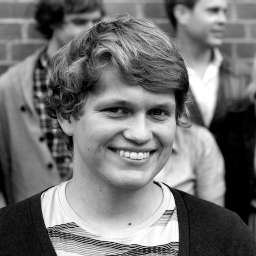Catalan director Calixto Bieito’s production of Offenbach’s The Tales of Hoffmann, which premiered last December, has now received its first revival. Several revisions to the original production and some cast changes made this a lot more of a success than the original run, but it still suffers from over-judicious cuts and at times puzzling direction.
Bieito’s Hoffmann imagines the title character as an alcoholic artist, constantly drunk so that the real world doesn’t get to him. The tales he tells of his three loves are mere drunken ramblings. Olympia is placed in a world of luxury, one where young beautiful women are seen as a commodity, easily replaceable. Surrounded by countless copies of herself, both real women and mannequins, she finally breaks down and goes on a murderous rampage, ending in her own, admittedly rather bloodless, suicide. The Antonia act is performed in period dress and in a white, almost sterile box above the stage. Bieito seems to want to distance the audience from the action, both in terms of dress and proximity to the action. When Dr Miracle examines Antonia, she gives birth to a white dove, the symbol of her beauty, youth and the lover that she sings about in the opening aria. As Dr Miracle hands the dove to Nicklausse, it becomes even clearer that the Muse has won: Hoffmann will be hers.
The most striking change from last year’s run of this production was the complete reworking of the Giulietta act. Where last year it had featured grimacing zombie-like creatures on a stylised Venetian bridge, it is now set on the blank stage of the Prologue – a seeming return to reality, even though Hoffmann hadn’t finished telling his tales. I was rather disappointed to lose Dapertutto in drag, but the restaging did make it somewhat more coherent. Still, the many cuts in the whole production (and the complete axing of the dialogue) made the Giulietta act the most difficult act to follow, as the story got completely lost. Even with music and dialogue complete, it's a tricky act to follow; stripping it down beyond the bare essentials did not make it any easier.
The singing ranged from fine to truly excellent, with spellbinding performances from Evan Bowers’ Hoffmann, Audrey Luna’s Olympia and – especially – Marita Sølberg’s Antonia. Bowers returned as Hoffmann and sang the entire role, unlike last time. The voice is powerful, with exciting high notes, but again, his portrayal of Hoffmann suffered from some at times hysterical overacting, especially in the last part of the Antonia scene. Audrey Luna's voice might not be the kind you usually hear the role of Olympia, but her performance of the Doll Song “Les oiseaux dans la charmille” was nothing short of breathtaking. She showed astounding control of her high register, interpolating several high As and B flats, and hit just the right balance between dominatrix and blow up doll this production dictates. Marita Sølberg’s Antiona was the vocal highlight of the evening, with her warm middle register giving way to a brilliant top, finishing with a brilliant trill. Her youthful, childish Antonia was a delight to watch.
Hege Høisæter’s Giulietta, while well characterised, suffered from a large degree of vocal caricature. There was some rather beautiful singing, although the possibilities were limited with her aria being cut and “Belle nuit, ô nuit d'amour” taken at such a pace that it seemed to be over before it had begun. Alfred Walker had a towering stage presence, with his stentorian voice giving a fine performance of the four villains. Especially his “Scintille, diamante” shone with careful phrasing and pure, delicious evil. Tone Kummervold’s Muse/Nicklausse took some time to warm up vocally, but her sassy portrayal, especially in the prologue and Olympia act, was a joy to behold. The arias in the Antonia act and the Epilogue were especially well-sung, both excellent showcases for her dark, plummy mezzo.
Calixto Bieito’s Hoffmann casts the title character as a failed artist, staving off reality through a constant whisky haze. Unwilling to realise what his life has become, he creates an entirely new universe for himself, one where Stella is no longer his reluctant wife, but instead an adoring opera singer and prospective conquest. The three middle acts with their fantastical heroines are all drunken fantasies, aspects of this Stella’s personality, a Stella who doesn’t even exist. As the crowds pull away from the Giulietta act, the real Stella enters, her and Hoffmann’s children in hand, only to leave him for what seems to be the final time. The illusion is complete as the Muse takes off her gown, revealing normal clothes and staggers off, whisky bottle in hand. Even though Hoffmann has now surrendered himself completely to art, everyone, even his Muse has left him.




